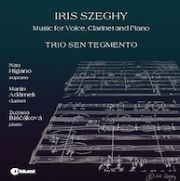Of hay songs and the no man's rose
Condensed forms, often based on simple material and leading to exalted outbursts, characterize the compositions on Iris Szeghy's new trio CD.

The singer begins with a rapidly rising and falling gesture, the clarinet imitates her, and so it goes on, alternating. Within a short space of time, the gesture changes, the voices intertwine, rub against each other and continue to rise until they get stuck on the highest note. Short, quiet repetitions follow and finally a simple Slovakian folk song, a howling song. To be heard in the Meadow Song by Iris Szeghy. The Slovakian composer, who has lived and worked in Zurich since 2001, knows how to take such simple material - imitation is actually the oldest musical craft - and develop a coherent form in a small space. Based on such experiences, I once called her a master of the small form many years ago, which she did not allow to go unchallenged: she could also create large sequences. So be it. As far as epically expansive works are concerned, you won't find them here on this CD, which she recorded with the Slovakian trio Sen Tegmento. The soprano Nao Higano, the clarinettist Martin Adámek and the pianist Zuzana Biščáková give an incredibly beautiful performance. Only the German pronunciation sometimes seems a little bumpy.
The way Szeghy condenses the music and formulates it succinctly, without any pressure to innovate, based on familiar material, is beautifully demonstrated here. Sometimes she begins with simple, almost banal sounds and then takes them to extremes, into theatrically exalted gestures. For example, the piano piece develops from a dull pounding Perpetuum mobile to garish cascades. In Folclorico a slow clarinet cantilena is contrasted by orientalisms in the piano, which again explode in violent outbursts. This has its pitfalls, as it threatens to disavow what was laid down at the beginning, for example when one of the "Hesse Splinters" (based on fragments by Hermann Hesse) sarcastically distorts into a loud laugh where immortality is concerned. Not all of the pieces escape the placativity. This is the danger of not only suggestive, but also over-explicit representation.
Particularly haunting is the setting of Paul Celan's Psalm for voice alone. Between whispering, whispering, speaking and dark singing, the poem, which is so moving and unladen, unfolds, blossoms for a moment, like the central "Niemandsrose" - and then sinks again. The Invocation of the Great Bear Ingeborg Bachmann's concludes the CD: In the dead silence, the music flutters out lightly and seriously.
Iris Szeghy: Music for Voice, Clarinet and Piano. Trio Sen Tegmento. Treble DK 0177-2231








